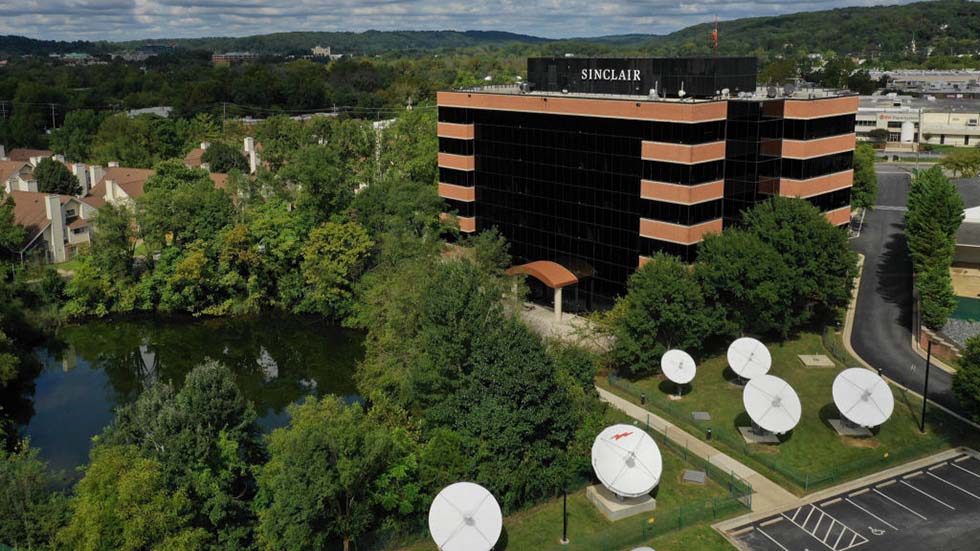Sinclair To Spend $300 Million To Reshape Venture Portfolio
Broadcaster reports second-quarter loss

The smarter way to stay on top of broadcasting and cable industry. Sign up below
You are now subscribed
Your newsletter sign-up was successful
Sinclair, with $300 million in cash to spend, announced a change in its investment philosophy as a way to boost the stock, which it considers undervalued.
The broadcaster reported a second-quarter net loss of $89 million, or $1.38 a share, compared to a loss of $11 million, or 17 cents, a year ago.
Revenues decreased 8% to $768 million, with media revenues down 8% to $761 million.
Company executives said they saw better times ahead, with auto ad revenue improving and a record presidential election year brewing.
Sinclair’s results no longer include the struggling regional sports networks business, now run by its Diamond Sports unit, which declared bankruptcy in March.
The company restructured, with Sinclair Broadcast Group, the company’s TV station business, becoming a unit of Sinclair, a holding company. The holding company also has a new unit Sinclair Ventures, which has the company’s investments, plus its Tennis Channel and Compulse advanced advertising business.
Also Read: Tennis Channel Earned $8 Million On $60 Million in Revenue In Q2
The smarter way to stay on top of broadcasting and cable industry. Sign up below
Speaking on the company’s earnings call Wednesday, Sinclair CEO Chris Ripley said the reorganization was designed to make the company’s finances more transparent, enabling investors to better value its parts.
Some of those parts are minority interests in businesses that do not find their way into the company’s consolidated earnings.
Sinclair Ventures has $326 million on the books, and Ripley said some of that will be used to shift its portfolio “from mostly minority-owned investments to majority-owned and consolidated investments.”
Ripley said the Sinclair Ventures portfolio is valued at $1.245 billion, including a $181 million Bally’s stake; $200 million in real estate; private equity and strategic venture investments of $236 million and direct investments of $303 million.
Tennis Channel is valued at $822 million and ad-tech company Compulse is valued at $204 million, making Sinclair Ventures really worth $2.271 billion not $1.245 billion, he said.
Ripley told analysts that Sinclair’s local media business was worth $5.664 billion, giving Sinclair as a whole a fair-market value of $7.474 billion
Subtracting the company’s $3.494 billion in debt, the company’s equity value should be $4.080 billion, or $64.72 a share. Instead it trades at a 79% discount, closing at $13.49 a share Wednesday.
“While we realize and acknowledge a current discount on our capital structure due to several issues, including some uncertainty related to the Diamond bankruptcy outcomes, we believe that a deep discount an the fair market values of our current assets remains unjustified,” Ripley said. “Management is keenly focused on closing this valuation gap as we continue to invest in both our local media and venture assets and businesses.”
In the media business, Sinclair Broadcast president Rob Weisbord said that despite pay TV subscribers cutting the cord faster than forecast, the company expected net retransmission revenue to grow in the low single digits. Sinclair has renewals with distributors coming up in the second half of the year and into 2024 representing about 90% of its Big Four affiliates.
At the same time “we anticipate our reverse transmission agreements to have modestly improve terms as the industry take into account current subscriber churn levels, as well as the loss of some additional exclusivity as networks withhold some content for their own streaming products,” Weisbord said.
Also Read: Sinclair Turns to Tech To Maximize Ad Revenue
Core advertising (excluding political) fell by less than 1% in the quarter. Spending in the auto category was up 6.5%. Looking ahead to the third quarter, national advertising appeared to be improving, Weisbord said.
Sinclair is expecting a record presidential election year in 2024. The broadcaster has stations in 23 of the 34 states with Senate races, seven of the 11 states with gubernatorial races and 10 of 12 presidential swing states.
During the first half of 2023, Sinclair has booked $9 million in political revenues, including $5.5 million in Q2. That’s up almost 10% from 2021.
The company forecasts seeing $25 million in ad spending in Q3.
Sinclair is launching 45 free, ad-supported streaming TV (FAST) channels that will carry local news. Weisbord said that he expects those channels to attract political advertising, especially as broadcast inventory tightens.
While the regional sports network business craters, Weisbord is bullish on teams turning to broadcast.
The Utah Jazz of the National Basketball Association made a deal to have its games broadcast by Sinclair’s KJZZ Salt Lake City.
Even before the NBA season starts, the station is seeing improved ratings from Summer League games and other Jazz-related content.
“What was old is new again,“ Weisbord said. “And the return of local sports team to broadcasting will build our value to the MVPDs in a strong way. Not only will we have local news, but broadcasters will be returning with local sports teams as well.”
Jon has been business editor of Broadcasting+Cable since 2010. He focuses on revenue-generating activities, including advertising and distribution, as well as executive intrigue and merger and acquisition activity. Just about any story is fair game, if a dollar sign can make its way into the article. Before B+C, Jon covered the industry for TVWeek, Cable World, Electronic Media, Advertising Age and The New York Post. A native New Yorker, Jon is hiding in plain sight in the suburbs of Chicago.

